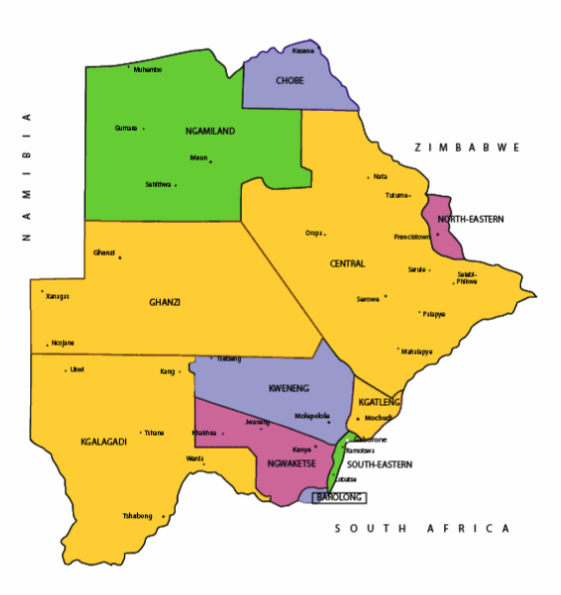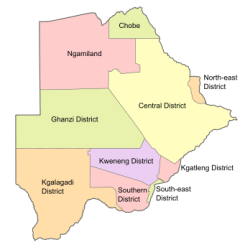Places and their polling stations in Mahalapye West, Botswana
184 Mahalapye North
0935 Mahalapye Primary School
0936 Botalaote Kgotla
0937 Thomadithotse Kgotla
0938 St. Patrick School
0939 VDC Office
0940 White City Kgotla
0941 Mahalapye JSS
0942 Tewane Kgotla
0943 Tewane-T-Junction (Tent)
185 Madiba
0944 Madiba Kgotla
0945 Baitiredi Clinic (Tent)
0946 Madiba Post Office (Tent)
0947 Madiba Clinic (Tent)
0948 Tidimalo Kgotla
0949 Madiba 14 Kgotla
0950 Patikwane Cattle Post
186 Mahalapye Central
0951 Borotsi Kgotla
0952 Main Kgotla
0953 Community Hall
0954 UCCSA (Tent)
0955 Herero Kgotla
187 Dilaene
0956 Spritual Healing Church
0957 Dilaene Kgotla
0958 Assemblies of God (Tent)
0959 St. John Church (Siwela) (Tent)
188 Ngakaagae
0960 Disabled Association
0961 Ngakaagae Primary School
0962 Leetile Primary School
0963 Mompati Day Care Centre (Tent)
0964 Mahalapye Hospice
189 Tshikinyega
0965 Tshikinyega Kgotla
0966 Tamocha Primary School
0967 St. James Primary School
0968 Holiness Church (Tent)
0969 Holy Ghost Church (Tent)
190 Parwe
0970 Tshikinyega Primary School
0971 Parwe JSS
0972 Citf Centre (Tent)
0973 Nthompe-Koma Primary School
0974 Twantsho Borukuthi Open Space (Tent)
191 Mahalapye South
0975 Xhosa 2 Kgotla
0976 Mowana JSS
0977 Mahalapye Education Centre (Tent)
0978 Roman Catholic Hall
0979 Mowana Kgotla
0980 Bokaa Kgotla
Reference: iec.gov.bw/index.php/electoral-districts/polling-stations.html
Botswana
Botswana is a country in Africa. It is topographically flat, with approximately 70 percent of its territory being the Kalahari Desert.
It is bordered by South Africa to the south and southeast, Namibia to the west and north, and Zimbabwe to the northeast.
Capital: Gaborone
Currency: Botswanan Pula
Official language: English
Population: 2.588 million (2021) World Bank
Dialing code: +267
Gross Domestic Product: 17.61 billion USD (2021) World Bank
Botswana’s ten districts are:
- Southern District
- South-East District
- Kweneng District
- Kgatleng District
- Central District
- North-East District
- Ngamiland District
- Kgalagadi District
- Chobe District
- Ghanzi District
Botswana’s councils created from urban or town councils are: Gaborone City, Francistown, Lobatse Town, Selebi-Phikwe Town, Jwaneng Town, Orapa Town and Sowa Township.






The name Botswana refers to ‘Land of the Tswana’. The landlocked, Southern Africa country is officially known as the Republic of Botswana.














Botswana is connected to Zambia through the Kazungula Bridge making it the world’s shortest border between two countries.
A country of slightly over 2 million people (2021), Botswana is one of the most sparsely populated countries in the world. It is essentially the nation state of the Tswana ethnic group, who make up 79% of the population.

About 11.6 per cent of the population lives in the capital and largest city, Gaborone.
Formerly one of the world’s poorest countries—with a GDP per capita of about US$70 per year in the late 1960s—it has since transformed itself into an upper-middle-income country, with one of the world’s fastest-growing economies.


The Tswana ethnic group were descended mainly from Bantu-speaking tribes who migrated southward of Africa to modern Botswana, living in tribal enclaves as farmers and herders.




In 1885, the British colonised the area and declared a protectorate under the name of Bechuanaland.
As colonisation stopped, Bechuanaland became an independent republic under its current name on 30 September 1966.


Since then, it has been a representative republic, with a consistent record of uninterrupted democratic elections and the lowest perceived corruption ranking in Africa since at least 1998.

The economy is dominated by mining and tourism. Botswana has a GDP (purchasing power parity) per capita of about $18,113 as of 2021, one of the highest in subsaharan Africa.


Botswana is the world’s biggest diamond producing country.
Its relatively high gross national income per capita gives the country a high standard of living and the third-highest Human Development Index of continental Sub-Saharan Africa (after Gabon and South Africa).
The country has been adversely affected by the HIV/AIDS epidemic. In 2002, Botswana began offering anti-retroviral drugs (ARVs) to help combat the epidemic.
Botswana is a member of the Southern African Customs Union, the Southern African Development Community, the Commonwealth of Nations, and the United Nations.

